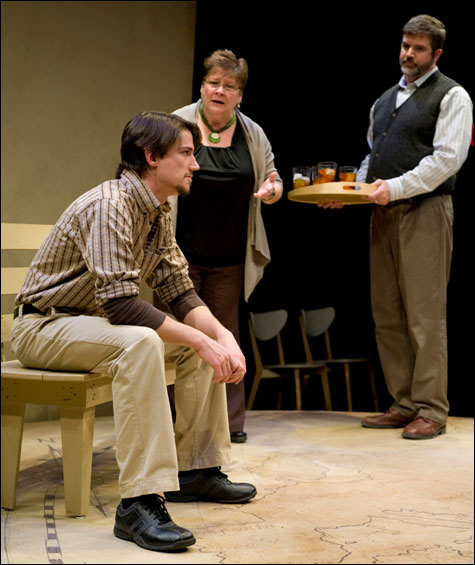
AN INTENSITY OF FOCUS Blanchette, Overly, and O'Brien. |
Grace takes place in the recent memories of the title character as well as in her difficult present. The basic concern here, which nags her like a toothache, is the non-existence of the divine, and the recurring pain of the question echoes in her memories each time she brings her mind to it. She's not troubled that God doesn't exist, but rather that she can't convince her loved ones of that fact.The Sandra Feinstein-Gamm Theatre is outdoing itself in this thunderously powerful production (through April 5), written by playwright Mick Gordon and London University philosophy professor A.C. Grayling. It's directed by Tony Estrella with an intensity of focus that keeps raising the temperature of the dialogues, like dancing a tarantella until the fever breaks.
Grace (Wendy Overly) teaches natural sciences in a university, so you would expect she'd have formulated an airtight case against the speculations of Intelligent Design. She does so with a vengeance, appalled that people can abandon their long-fought evolutionary gain of reason and believe the most dangerous of superstitious attitudes, their fantastic invention of God. Religious wars between these vying fantasies have killed millions, after all.
"To believe something in the face of evidence and against reason — to believe something by faith — is ignoble, ignorant, and irresponsible. And merits the opposite of respect," she insists.
Grace contends that she is not an atheist, but rather a naturalist. Atheism is a religious term that gives credibility to its opposite notion — faith in a God — and it is foolish to argue against something that doesn't exist. Richard Dawkins, move over; Christopher Hitchens, quiet down — she doesn't even want your enemies to have a voice in the argument.
Things get personal and emotional for Grace twice, when tragedies strike her family. The first is when her adult son Tom (Kyle Blanchette), an intelligent and rational lad until that point, decides to become an Episcopalian priest. Grace argues with him with the fervor of a tent revivalist shouting to save a soul. He is by turns amused and angry. "You're never going to turn the world's religious into atheists," he insists. The best that can be done is what he intends — "to turn bad, violent religion into better religion."
This play is no dry thesis nailed onto a door, though. The ironies alone are entertaining, such as Grace's position that arguments on the subject, which she is always fervently engaging in, should not be taking place at all. Usually bemused by all of this is her Jewish husband, Tony (Jim O'Brien), who isn't at all disappointed that his son doesn't want to be a rabbi. "Look on the bright side," he says to Grace, "who's going to take a priest called Friedman seriously?" "Oy vey, Maria?" he later quips.
As brought to life here by these fine actors and attentive director, this play of ideas is swimming in emotions. All these thoughtful characters risk drowning. Toward the end of this intermission-less 90-minute play, when you think that the emotional stakes have gone as high as possible and all bets are in, Tom's fiancée Ruth (Karen Carpenter) goes on at length to a silent, apologetic Grace, about how she has decided that the most important thing to give to her child isn't love but rather kindness, a much more difficult task.
As riveting as Carpenter's scene is, fraught with grief in the wake of the death of one of the men, Overly finally speaks, and soon we're overwhelmed once more. Overly is remarkable in this play and astonishing in this scene. That's not simply because she delivers an emotional tour de force, but also because it's such a nuanced progression of feelings particular to this character. By the end of the scene, the hyper-rational Grace is on her knees, screaming that she deserves scorn for not having averted the death: her vaunted reason should have ridden to the rescue, argued him out of danger in the first place.
The Gamm production of Grace is the kind of theater where non-theatergoers discover what they've been missing and become devoted attendees. The play loses us here and there, going back and forth in time, but by its conclusion we end up where we ought to be: Shaken, thinking, and talking about the experience with anyone who will listen.